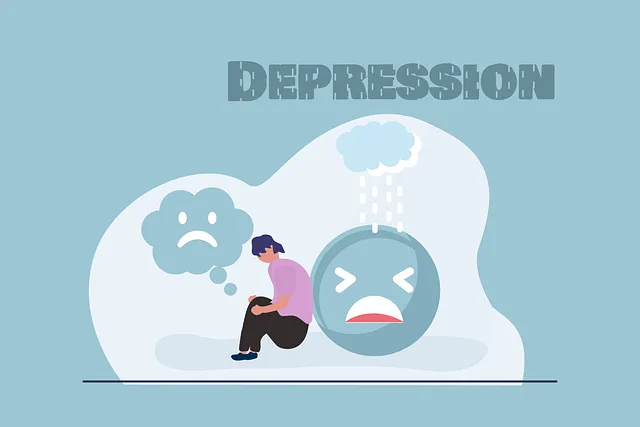Mindfulness meditation, recognized by organizations like Kaiser Permanente for its mental health benefits, involves focusing on the present moment without judgment. Beginners should start with short (5-10 minute) breath awareness sessions, gradually increasing duration. Regular practice reduces stress, anxiety, and depression, enhances emotional regulation, and contributes to Mental Illness Stigma Reduction. Starting is easy: set aside 10 minutes daily in a quiet space, focus on the breath, and acknowledge thoughts without judgment. Overcoming challenges like a wandering mind or physical discomfort is normal; techniques like body scanning aid navigation. Advanced practitioners can explore deeper relaxation methods. The Kaiser Permanente psychiatry phone number in Castle Rock offers tailored support for skill development and resilience-building through mindfulness meditation.
Discover the transformative power of mindfulness meditation with our comprehensive guide. This article, tailored by experts at Kaiser Permanente, explores ‘Understanding Mindfulness Meditation: A Basic Guide’, highlighting its benefits for mental well-being. From ‘Getting Started’ with practical tips for beginners to ‘Overcoming Challenges’ and advanced techniques, learn how to integrate this powerful practice into your daily routine, even in the face of stress or uncertainty. Find your inner peace today – contact our psychiatry team at Kaiser Permanente Castle Rock for more insights.
- Understanding Mindfulness Meditation: A Basic Guide
- The Benefits of Regular Practice for Mental Well-being
- Getting Started: Practical Tips for Beginners
- Overcoming Challenges and Advanced Techniques
Understanding Mindfulness Meditation: A Basic Guide

Mindfulness meditation is a practice that focuses on being fully present and engaged with the current moment, accepting it without judgment. It involves paying attention to your thoughts, feelings, bodily sensations, and surroundings in a non-reactive manner. This ancient technique has gained popularity due to its numerous mental health benefits, as recognized by organizations like Kaiser Permanente. By integrating mindfulness into your daily routine, you can enhance your overall well-being.
For beginners, establishing a consistent meditation practice might seem challenging. Start small with just 5-10 minutes each day and gradually increase the duration. Focus on your breath as an anchor, observing its rhythm without trying to control it. When thoughts or distractions arise, gently guide your attention back to your breath. Over time, this practice will cultivate inner strength and foster a deeper sense of calm, contributing to your self-care routine development for better mental health. Additionally, cultivating cultural sensitivity in mental healthcare practice can create a more inclusive environment, making it accessible to diverse populations.
The Benefits of Regular Practice for Mental Well-being

Regular mindfulness meditation practice offers a wealth of benefits for mental well-being, as backed by research conducted by professionals like those available at the Kaiser Permanente psychiatry phone number in Castle Rock. By cultivating present-moment awareness and learning to non-judgmentally observe thoughts and emotions, individuals can significantly reduce symptoms associated with stress, anxiety, and depression. This practice enhances emotional regulation, enabling better coping mechanisms and improved overall mental resilience.
Beyond individual benefits, consistent mindfulness meditation contributes to broader societal goals such as Mental Illness Stigma Reduction Efforts and Empathy Building Strategies. Public Awareness Campaigns Development can be amplified by fostering a culture of present-moment awareness, leading to increased understanding and compassion for individuals navigating mental health challenges. This collective shift in perspective can promote supportive communities where everyone’s well-being is prioritized.
Getting Started: Practical Tips for Beginners

Starting your mindfulness meditation journey can be intimidating, but with a few practical tips, beginners can navigate this path with ease. One essential step is to set aside dedicated time each day for practice—even just 10 minutes can make a significant difference. Find a quiet space where you won’t be disturbed; it could be your bedroom or a peaceful corner in your home. Ensure your posture is comfortable yet upright; sitting on the floor with legs crossed is ideal, but any position that allows you to remain still and alert will do.
Begin by focusing on your breath. Close your eyes and gently pay attention to the sensation of air flowing in and out of your nostrils. When thoughts arise—and they will—don’t judge or suppress them; simply acknowledge them and return your focus to your breath. This practice, known as mindfulness meditation, is a powerful tool for stress reduction, improving mental clarity, and enhancing overall well-being. For those seeking guidance, reaching out to professionals like the Kaiser Permanente psychiatry phone number in Castle Rock can provide valuable support and resources for coping skills development and burnout prevention through self-awareness exercises.
Overcoming Challenges and Advanced Techniques

Overcoming challenges is a natural part of any meditation practice, and mindfulness is no exception. Many beginners may find themselves facing obstacles such as a wandering mind or physical discomfort during sessions. To overcome these hurdles, it’s essential to remember that mindfulness is about acceptance and non-judgment. Techniques like scanning your body for tension and gently guiding your focus back to the breath can help navigate these challenges.
As practitioners advance, they may explore more intricate mindfulness meditation techniques to enhance their practice. Advanced methods include focused attention on specific sensations or objects, such as sounds or visual imagery. These advanced techniques promote deeper relaxation, increased concentration, and enhanced emotional resilience. For those seeking further guidance, resources like the Kaiser Permanente psychiatry phone number in Castle Rock can offer valuable support tailored to individual needs, contributing to the overall development of mindfulness meditation skills and resilience-building through public awareness campaigns.
Mindfulness meditation, a simple yet powerful practice, can significantly enhance mental well-being. As guided by experts at Kaiser Permanente, Castle Rock, regular mindfulness sessions offer a holistic approach to stress reduction and improved focus. Whether you’re a beginner or looking for advanced techniques, the benefits are accessible to all. Start your journey towards inner peace today, and remember that consistent practice is key to unlocking the full potential of mindfulness meditation.






